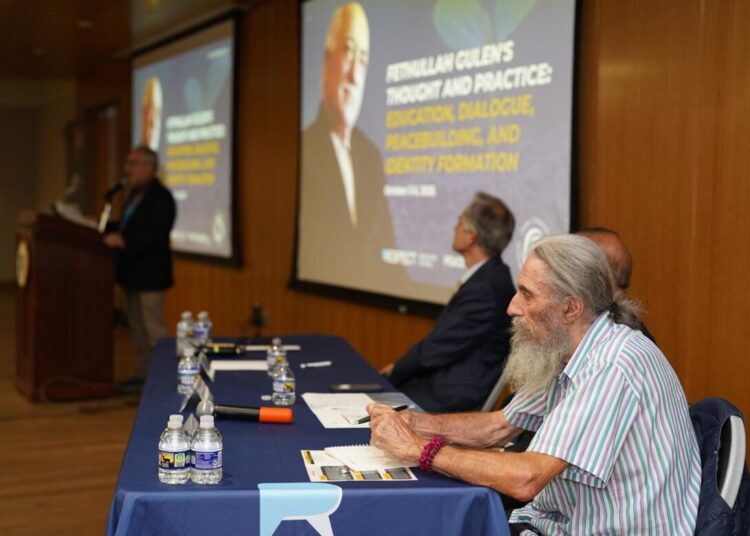Levent Kenez/Stockholm
Documents obtained by Nordic Monitor show that multiple foreign and Turkish academics or participants who attended a 2025 academic conference in New Jersey on the thoughts of the late preacher and thinker Fethullah Gülen were individually profiled and entered into Turkey’s intelligence database according to internal instructions circulated between Turkish police departments.
The documents, which reflect communication between various Turkish law enforcement units, describe the monitoring of a three-day event held at Drew University in Madison, New Jersey, October 3-5. The conference, titled “Fethullah Gülen’s Thought and Practice: Education, Dialogue, Peacebuilding and Identity Formation,” was organized by the Respect Graduate School and the Peace Islands Institute and brought together American, British and other international scholars in religious studies, philosophy, interfaith initiatives and peacebuilding.
According to the official correspondence, the information about participants was gathered under what Turkish authorities describe as efforts to detect and decipher Gülen movement activities. The movement has been fiercely critical of the government of President Recep Tayyip Erdogan, particularly on issues such as alleged pervasive corruption and claims of Ankara’s complicity in supporting radical jihadist groups. The movement was falsely designated as the Fethullahist Terrorist Organization (FETÖ) and subjected to an unprecedented crackdown in Turkey.
The document indicates that a letter from the Turkish Ministry of Foreign Affairs, whose name is coded as Institution V, triggered police efforts to identify conference participants. Signed by Police Chief Mustafa Yalçın Güven of the counterterrorism department, the confidential file orders that individually prepared reports on the profiled persons be sent to judicial authorities:
The materials include photographs and publicly available images of several academics whose participation in the conference was documented by Turkish security units, including Father James Puglisi, a Catholic priest and scholar known for his work in ecumenism and Christian–Muslim dialogue; British scholar Paul Weller, known for his research on religion and society; Oliver Lehmann, a UK-based scholar of comparative philosophy and religious thought; Wendi Lawson, known for her work in inter-religious studies; and Inamul Haq, a US-based professor of Islamic studies.
The internal instructions outline a detailed workflow for how provincial police offices are to handle the information. One section specifies that the original documents must not be shared outside the chain of command and that only material relevant to a particular province should be distributed to its respective police directorate. Police units are instructed to conduct research, assessment and evaluation regarding each identified individual in coordination with intelligence departments even in cases where no judicial records exist. For every person, the departments are required to prepare individualized notes and attach them to case files before submitting them to judicial authorities if additional instructions are issued at a later stage.
The texts emphasize secrecy throughout. Officials are told to follow the need-to-know rule, preventing individuals without authorization from accessing the information. The correspondence states that any deviation from these restrictions could compromise investigative procedures, although it reiterates several times that the intelligence material itself is not suitable for use as legal evidence.
The conference at Drew University featured panel discussions, academic lectures and open sessions exploring Gülen’s influence on education, dialogue activities and community-building initiatives. The program, publicly available at the time of the event, listed all participants, session topics and sponsoring institutions.
The documents show that the profiling extended beyond Turkish nationals to include US citizens, British academics and other foreign participants who appeared in conference photographs or took part in sessions. The status of being a foreign national did not exclude individuals from the intelligence categorization described in the correspondence.
The profiling document also included prominent Turkish participants. Above: former NBA player Enes Kanter. Below: theologian Abdullah Aymaz:
Although the Turkish memos state that the collected data is not legally actionable, they provide step-by-step instructions for provincial departments to prepare and archive personalized documents for each identified attendee. These include biographical notes and any additional observations produced during the follow-up assessments. Once completed, these individualized reports are to be sent to the relevant judicial authorities depending on subsequent directives. Centralized reporting procedures require provincial departments to inform the national headquarters about the outcome of their assessments, ensuring that the intelligence cycle is closed at the administrative level.
Speakers at the conference are also marked in the profiling document:
Drew University’s online materials identified the conference as an academic gathering focusing on scholarship and dialogue, with the organizers publishing details of participants and speakers well in advance. The Turkish records replicate elements of those publicly available sources, including session descriptions and official photographs, but reorganize them into a format consistent with intelligence reporting.
The inclusion of internationally recognized academics in Turkish intelligence files illustrates the scope of the surveillance described in the correspondence. Each name identified in the conference materials was marked for further assessment regardless of citizenship, academic discipline or role at the event. Since the documents specify that the information should not trigger immediate legal action, the profiling appears aimed at record-building rather than prosecution.
The instructions conclude by clearly stating that all documents must be kept secret and that every provincial police unit must send the results of its assessments back to the central department that started the investigation.












